Campus/People
-
 “A drop of water shall be returned with a rushing river.”
- Chinese KAISTians Donate Supplies to Fight COVID-19 in Daegu -
The Chinese community at KAIST donated 2.49 million won worth of personal protective equipment on March 4 to support on-site medical personnel in the city of Daegu. South Korea has been witnessing a significant surge in novel COVID-19 transmissions, and Daegu and nearby North Gyeongsang Province are the most affected regions.
As the COVID-19 situation grows more serious globally day by day, a Chinese master’s student from the KAIST Department of Civil and Environmental Engineering, Yuewen Jia, suggested a fundraising campaign on the KAIST Chinese Community’s WeChat messenger chat room, and her idea was enthusiastically supported by many peer-members. The KAIST Chinese Community is comprised of 105 undergraduates, graduates, post-doctoral fellows, researchers, and professors.
With Jia’s post-doc colleague Pei Li volunteering to manage the fundraising process, a total of 2.49 million won was collected in 12 days between January 27 and February 7.
The donors, including Qin Xu, a PhD candidate in the School of Electrical Engineering, reportedly asked for their donations to be used to support on-site medical personnel affected by the outbreak. They believed that medical supplies are the most essential in times like these. The group purchased personal protective equipment online and waited for more than 20 days until the items were finally delivered to them. The goods include 1,280 protective caps, 57 protective suits, 15 protective glasses, and two protective face shields.
Given the surging spread of the COVID-19 disease in Korea, where the confirmed cases have increased multi-fold since mid-February, the KAIST Chinese Community decided that their items should be used immediately in Korea, instead of being sent back to their home country as they had planned.
Guoyuan An, a student representative of the community studying for his master’s degree in the School of Computing, said, “Earlier, some members of the KAIST Chinese Community who had visited China were self-quarantined for two weeks in a special facility designated by KAIST as a precautionary measure. Thanks to the outstanding care we received from offices at KAIST including the COVID-19 Task Force Team, the International Office, the Student Offices, and the Clinic, those who were quarantined could return to campus safe and healthy.”
He continued, “KAIST and the Koreans as a whole spared no effort in helping China and Chinese people living in Korea fight the COVID-19 outbreak in its early days, and all of the members of the KAIST Chinese Community felt deeply grateful for all the attention and aid. This has been a definitive reason for us to change the donate recipient from China to Korea.”
“As an old Chinese saying goes, ‘A drop of water shall be returned with a rushing river.’ This proverb means that even if you receive a little help from others, you should return the favor with all you can when others are in need. We decided to make a donation ourselves in hopes that our small contribution could help on-site medical personnel work for the health and wellbeing of Koreans who are affected in that area.” he explained.
The donated items were delivered to the Division of Disaster Preparedness and Emergency Management at the Daegu Metropolitan Government Office, with help from the on-campus medical center KAIST Clinic Pappalardo Center and the KAIST International Scholar and Student Services (ISSS) Team.
Dr. Yun-Jung Lee, the executive director of the KAIST Clinic Pappalardo Center, expressed “a huge thank you to the KAIST Chinese Community for pitching in to help battle this national and global crisis.”
She added, “Their donations have been passed to those in desperate need, and their warm-hearted act of kindness will go a long way.”
(END)
2020.03.05 View 10158
“A drop of water shall be returned with a rushing river.”
- Chinese KAISTians Donate Supplies to Fight COVID-19 in Daegu -
The Chinese community at KAIST donated 2.49 million won worth of personal protective equipment on March 4 to support on-site medical personnel in the city of Daegu. South Korea has been witnessing a significant surge in novel COVID-19 transmissions, and Daegu and nearby North Gyeongsang Province are the most affected regions.
As the COVID-19 situation grows more serious globally day by day, a Chinese master’s student from the KAIST Department of Civil and Environmental Engineering, Yuewen Jia, suggested a fundraising campaign on the KAIST Chinese Community’s WeChat messenger chat room, and her idea was enthusiastically supported by many peer-members. The KAIST Chinese Community is comprised of 105 undergraduates, graduates, post-doctoral fellows, researchers, and professors.
With Jia’s post-doc colleague Pei Li volunteering to manage the fundraising process, a total of 2.49 million won was collected in 12 days between January 27 and February 7.
The donors, including Qin Xu, a PhD candidate in the School of Electrical Engineering, reportedly asked for their donations to be used to support on-site medical personnel affected by the outbreak. They believed that medical supplies are the most essential in times like these. The group purchased personal protective equipment online and waited for more than 20 days until the items were finally delivered to them. The goods include 1,280 protective caps, 57 protective suits, 15 protective glasses, and two protective face shields.
Given the surging spread of the COVID-19 disease in Korea, where the confirmed cases have increased multi-fold since mid-February, the KAIST Chinese Community decided that their items should be used immediately in Korea, instead of being sent back to their home country as they had planned.
Guoyuan An, a student representative of the community studying for his master’s degree in the School of Computing, said, “Earlier, some members of the KAIST Chinese Community who had visited China were self-quarantined for two weeks in a special facility designated by KAIST as a precautionary measure. Thanks to the outstanding care we received from offices at KAIST including the COVID-19 Task Force Team, the International Office, the Student Offices, and the Clinic, those who were quarantined could return to campus safe and healthy.”
He continued, “KAIST and the Koreans as a whole spared no effort in helping China and Chinese people living in Korea fight the COVID-19 outbreak in its early days, and all of the members of the KAIST Chinese Community felt deeply grateful for all the attention and aid. This has been a definitive reason for us to change the donate recipient from China to Korea.”
“As an old Chinese saying goes, ‘A drop of water shall be returned with a rushing river.’ This proverb means that even if you receive a little help from others, you should return the favor with all you can when others are in need. We decided to make a donation ourselves in hopes that our small contribution could help on-site medical personnel work for the health and wellbeing of Koreans who are affected in that area.” he explained.
The donated items were delivered to the Division of Disaster Preparedness and Emergency Management at the Daegu Metropolitan Government Office, with help from the on-campus medical center KAIST Clinic Pappalardo Center and the KAIST International Scholar and Student Services (ISSS) Team.
Dr. Yun-Jung Lee, the executive director of the KAIST Clinic Pappalardo Center, expressed “a huge thank you to the KAIST Chinese Community for pitching in to help battle this national and global crisis.”
She added, “Their donations have been passed to those in desperate need, and their warm-hearted act of kindness will go a long way.”
(END)
2020.03.05 View 10158 -
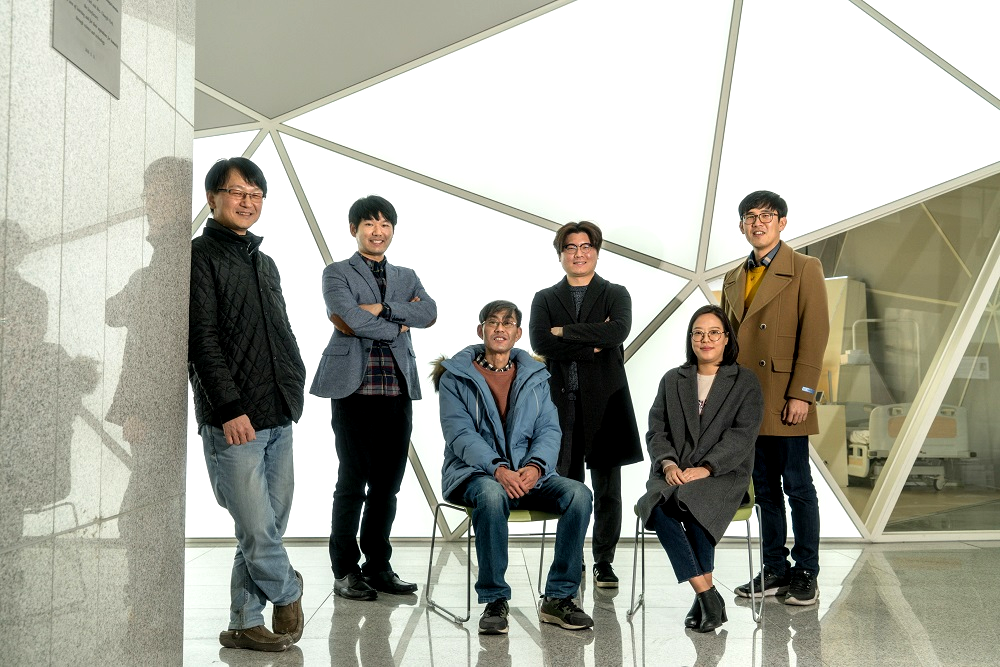 Professor Hojong Chang’s Research Team Wins ISIITA 2020 Best Paper Award
The paper written by Professor Hojong Chang’s research team from KAIST Institute for IT Convergence won the best paper award from the International Symposium on Innovation in Information Technology Application (ISIITA) 2020, held this month at Ton Duc Thang University in Vietnam.
ISIITA is a networking symposium where leading researchers from various fields including information and communications, biotechnology, and computer systems come together and share on the convergence of technology.
Professor Chang’s team won the best paper award at this year’s symposium with its paper, “A Study of Single Photon Counting System for Quantitative Analysis of Luminescence”. The awarded paper discusses the realization of a signal processing system for silicon photomultipliers.
The silicon photomultiplier is the core of a urinalysis technique that tests for sodium and potassium in the body using simple chemical reactions. If our bodily sodium and potassium levels exceed a certain amount, it can lead to high blood pressure, cardiovascular problems, and kidney damage.
Through this research, the team has developed a core technique that quantifies the sodium and potassium discharged in the urine. When the reagent is injected into the urine, a very small amount of light is emitted as a result of the chemical reaction. However, if there is a large amount of sodium and potassium, they interrupt the reaction and reduce the emission. The key to this measurement technique is digitizing the strength of this very fine emission of light. Professor Chang’s team developed a system that uses a photomultiplier to measure the chemiluminescence.
Professor Chang said, “I look forward for this signal processing system greatly helping to prevent diseases caused by the excessive consumption of sodium and potassium through quick and easy detection.”
Researcher Byunghun Han who carried out the central research for the system design added, “We are planning to focus on miniaturizing the developed technique, so that anyone can carry our device around like a cellphone.”
The research was supported by the Ministry of Science and ICT.
(END)
2020.02.27 View 11225
Professor Hojong Chang’s Research Team Wins ISIITA 2020 Best Paper Award
The paper written by Professor Hojong Chang’s research team from KAIST Institute for IT Convergence won the best paper award from the International Symposium on Innovation in Information Technology Application (ISIITA) 2020, held this month at Ton Duc Thang University in Vietnam.
ISIITA is a networking symposium where leading researchers from various fields including information and communications, biotechnology, and computer systems come together and share on the convergence of technology.
Professor Chang’s team won the best paper award at this year’s symposium with its paper, “A Study of Single Photon Counting System for Quantitative Analysis of Luminescence”. The awarded paper discusses the realization of a signal processing system for silicon photomultipliers.
The silicon photomultiplier is the core of a urinalysis technique that tests for sodium and potassium in the body using simple chemical reactions. If our bodily sodium and potassium levels exceed a certain amount, it can lead to high blood pressure, cardiovascular problems, and kidney damage.
Through this research, the team has developed a core technique that quantifies the sodium and potassium discharged in the urine. When the reagent is injected into the urine, a very small amount of light is emitted as a result of the chemical reaction. However, if there is a large amount of sodium and potassium, they interrupt the reaction and reduce the emission. The key to this measurement technique is digitizing the strength of this very fine emission of light. Professor Chang’s team developed a system that uses a photomultiplier to measure the chemiluminescence.
Professor Chang said, “I look forward for this signal processing system greatly helping to prevent diseases caused by the excessive consumption of sodium and potassium through quick and easy detection.”
Researcher Byunghun Han who carried out the central research for the system design added, “We are planning to focus on miniaturizing the developed technique, so that anyone can carry our device around like a cellphone.”
The research was supported by the Ministry of Science and ICT.
(END)
2020.02.27 View 11225 -
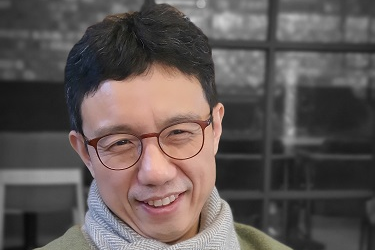 Professor Jong Chul Ye Appointed as Distinguished Lecturer of IEEE EMBS
Professor Jong Chul Ye from the Department of Bio and Brain Engineering was appointed as a distinguished lecturer by the International Association of Electrical and Electronic Engineers (IEEE) Engineering in Medicine and Biology Society (EMBS). Professor Ye was invited to deliver a lecture on his leading research on artificial intelligence (AI) technology in medical video restoration. He will serve a term of two years beginning in 2020.
IEEE EMBS's distinguished lecturer program is designed to educate researchers around the world on the latest trends and technology in biomedical engineering. Sponsored by IEEE, its members can attend lectures on the distinguished professor's research subject.
Professor Ye said, "We are at a time where the importance of AI in medical imaging is increasing.” He added, “I am proud to be appointed as a distinguished lecturer of the IEEE EMBS in recognition of my contributions to this field.”
(END)
2020.02.27 View 11873
Professor Jong Chul Ye Appointed as Distinguished Lecturer of IEEE EMBS
Professor Jong Chul Ye from the Department of Bio and Brain Engineering was appointed as a distinguished lecturer by the International Association of Electrical and Electronic Engineers (IEEE) Engineering in Medicine and Biology Society (EMBS). Professor Ye was invited to deliver a lecture on his leading research on artificial intelligence (AI) technology in medical video restoration. He will serve a term of two years beginning in 2020.
IEEE EMBS's distinguished lecturer program is designed to educate researchers around the world on the latest trends and technology in biomedical engineering. Sponsored by IEEE, its members can attend lectures on the distinguished professor's research subject.
Professor Ye said, "We are at a time where the importance of AI in medical imaging is increasing.” He added, “I am proud to be appointed as a distinguished lecturer of the IEEE EMBS in recognition of my contributions to this field.”
(END)
2020.02.27 View 11873 -
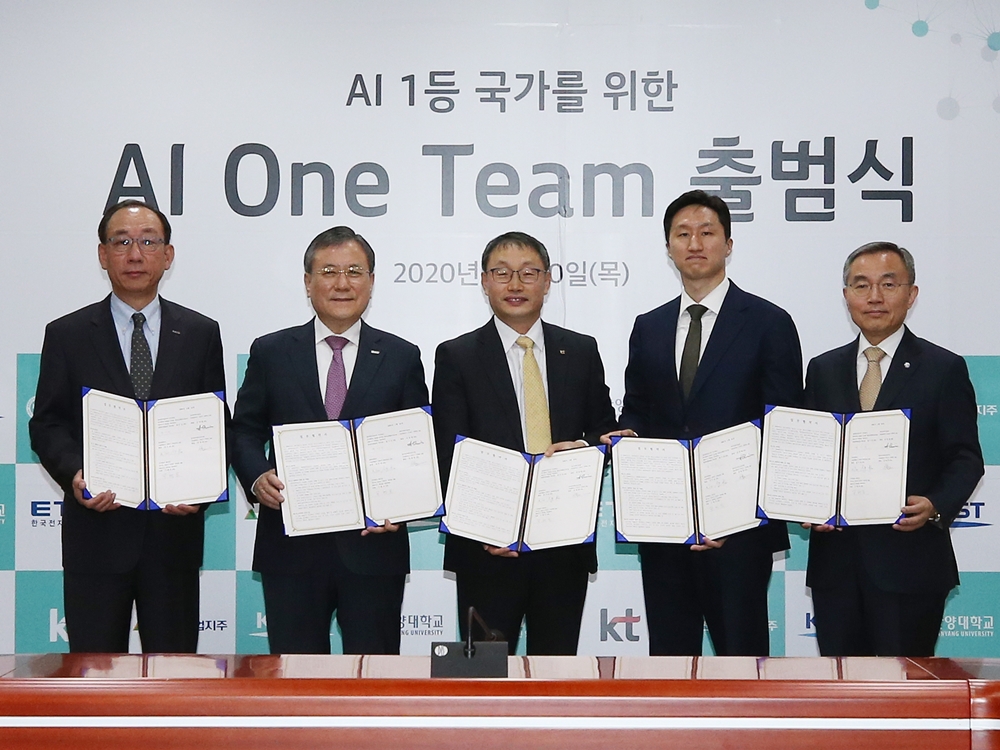 KAIST Launches AI Alliance with KT, Hyundai, ETRI, Hanyang University
KAIST launched the AI collaboration alliance “AI One Team” partnering with the nation’s top telecommunications company KT, the Electronics and Telecommunications Research Institute (ETRI), Hyundai Heavy Industries Holdings, and Hanyang University on February 21.
President Sung-Chul Shin signed the MOU with KT CEO Hyun-Mo Koo, Hyundai Heavy Industries Holdings Vice President Ki-Sun Chung, President Myung Joon Kim of ETRI, and Hanyang University President Woo-Seung Kim to help the nation’s AI technology stay ahead of the global level. Vice Minister of Science and ICT Seokyoung Jang also attended the signing ceremony held at KAIST.
Four parties representing the government, industry, research institutes, and universities all agreed to collaborate to establish an educational platform fostering AI talents; develop AI technologies applicable to industrial sites; nurture an AI technology eco-system that will embrace SEMs and venture companies; and incubate startups to help improve their technological competitiveness.
KAIST will take the lead in fostering AI talents in collaboration with ETRI and Hanyang University, offering an online/offline educational program featuring AI curricula that will be practically applicable to the industry. The alliance will also create a platform that will match job seekers and companies, especially for SMEs and venture firms that are having trouble finding competitive experts.
Hyundai Heavy Industries Holdings is focusing on developing technologies in the fields of robotics and smart factories. Hyundai’s collaboration with KT is pushing the digital transformation in the new domains of 5G-based robots and smart factories. The two companies plan to expand their technological know-how to SMEs, venture firms, and startups. The secretariat of the AI One Team will facilitate collaborative projects among the partners to help produce tangible results.
President Shin expressed his high hopes on this alliance for AI technology. He declared, “The winner takes all in the field of AI. Our close collaboration will pave the way for Korea, and each of our partners will lead AI technology in the global market. We will spare no effort for this alliance.”
2020.02.21 View 5583
KAIST Launches AI Alliance with KT, Hyundai, ETRI, Hanyang University
KAIST launched the AI collaboration alliance “AI One Team” partnering with the nation’s top telecommunications company KT, the Electronics and Telecommunications Research Institute (ETRI), Hyundai Heavy Industries Holdings, and Hanyang University on February 21.
President Sung-Chul Shin signed the MOU with KT CEO Hyun-Mo Koo, Hyundai Heavy Industries Holdings Vice President Ki-Sun Chung, President Myung Joon Kim of ETRI, and Hanyang University President Woo-Seung Kim to help the nation’s AI technology stay ahead of the global level. Vice Minister of Science and ICT Seokyoung Jang also attended the signing ceremony held at KAIST.
Four parties representing the government, industry, research institutes, and universities all agreed to collaborate to establish an educational platform fostering AI talents; develop AI technologies applicable to industrial sites; nurture an AI technology eco-system that will embrace SEMs and venture companies; and incubate startups to help improve their technological competitiveness.
KAIST will take the lead in fostering AI talents in collaboration with ETRI and Hanyang University, offering an online/offline educational program featuring AI curricula that will be practically applicable to the industry. The alliance will also create a platform that will match job seekers and companies, especially for SMEs and venture firms that are having trouble finding competitive experts.
Hyundai Heavy Industries Holdings is focusing on developing technologies in the fields of robotics and smart factories. Hyundai’s collaboration with KT is pushing the digital transformation in the new domains of 5G-based robots and smart factories. The two companies plan to expand their technological know-how to SMEs, venture firms, and startups. The secretariat of the AI One Team will facilitate collaborative projects among the partners to help produce tangible results.
President Shin expressed his high hopes on this alliance for AI technology. He declared, “The winner takes all in the field of AI. Our close collaboration will pave the way for Korea, and each of our partners will lead AI technology in the global market. We will spare no effort for this alliance.”
2020.02.21 View 5583 -
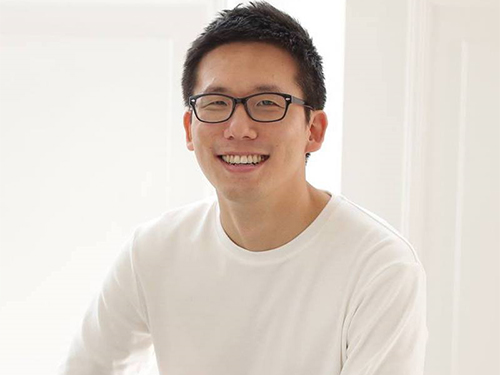 Professor Minsoo Rhu Recognized as Facebook Research Scholar
Professor Minsoo Rhu from the School of Electrical Engineering was selected as the recipient of the Systems for Machine Learning Research Awards presented by Facebook.
Facebook launched the award last year with the goal of funding impactful solutions in the areas of developer tookits, compilers and code generation, system architecture, memory technologies, and machine learning accelerator support.
A total of 167 scholars from 100 universities representing 26 countries submitted research proposals, and Facebook selected final 10 scholars. Professor Rhu made the list with his research topic ‘A Near-Memory Processing Architecture for Training Recommendation Systems.’ He will receive 5,000 USD in research funds at the award ceremony which will take place during this year’s AI Systems Faculty Summit at the Facebook headquarters in Menlo Park, California.
Professor Rhu’s submission was based on research on ‘Memory-Centric Deep Learning System Architecture’ that he carried out for three years under the auspices of Samsung Science and Technology Foundation from 2017. It was an academic-industrial cooperation research project in which leading domestic companies like Samsung Electronics and SK Hynix collaborated to make a foray into the global memory-centric smart system semiconductor market.
Professor Rhu who joined KAIST in 2018 has led various systems research projects to accelerate the AI computing technology while working at NVIDIA headquarters from 2014.
(END)
2020.02.21 View 10754
Professor Minsoo Rhu Recognized as Facebook Research Scholar
Professor Minsoo Rhu from the School of Electrical Engineering was selected as the recipient of the Systems for Machine Learning Research Awards presented by Facebook.
Facebook launched the award last year with the goal of funding impactful solutions in the areas of developer tookits, compilers and code generation, system architecture, memory technologies, and machine learning accelerator support.
A total of 167 scholars from 100 universities representing 26 countries submitted research proposals, and Facebook selected final 10 scholars. Professor Rhu made the list with his research topic ‘A Near-Memory Processing Architecture for Training Recommendation Systems.’ He will receive 5,000 USD in research funds at the award ceremony which will take place during this year’s AI Systems Faculty Summit at the Facebook headquarters in Menlo Park, California.
Professor Rhu’s submission was based on research on ‘Memory-Centric Deep Learning System Architecture’ that he carried out for three years under the auspices of Samsung Science and Technology Foundation from 2017. It was an academic-industrial cooperation research project in which leading domestic companies like Samsung Electronics and SK Hynix collaborated to make a foray into the global memory-centric smart system semiconductor market.
Professor Rhu who joined KAIST in 2018 has led various systems research projects to accelerate the AI computing technology while working at NVIDIA headquarters from 2014.
(END)
2020.02.21 View 10754 -
 Jeju Inspired Packaging by ID+IM Design Lab Wins 2020 iF Design Award
A water bottle designed by researchers from the ID+IM Design Laboratory led by Professor Sangmin Bae from the Department of Industrial Design won the packaging section of the 2020 iF Design Award.
The iF Design Award, hosted by the Hannover Exhibition Center in Germany, is one of the three major international design competitions. It receives more than 7,000 submissions from participants representing 60 countries.
The Jeju Yong-Am-Soo (which means ‘volcanic mineral water’ in English) bottle design was a product of an academic-industrial cooperation project carried out by Professor Bae’s team and a Korean confectionery company, Orion Corporation, to create a design for a premium mineral water bottle.
The motif of the awarded design was the beautiful nature of Jeju Island in Korea. The columnar joints and the horizon of Jeju Island were each represented by horizontal and vertical lines, completing a simple yet sensuous design.
The mystical volcanic Mount Halla printed on the transparent front-label of the bottle represents the daytime of Jeju Island, while the rear-label design, which is reflected through the transparent front-label, symbolizes the nighttime of Jeju Island. By putting the Orion constellation, a symbol of tourist’s guide, right above the Orion Corporation’s brand logo, Professor Bae’s team ambiently promotes the company’s identity.
Although the design uses a significantly smaller amount of materials than traditional water bottles, it can withstand about four times the pressure and weight. The efficient structure therefore shows excellence in both aesthetic and functional areas.
Professor Bae said, “I am happy with the fact that the result of this academic-industrial cooperation project became mass-produced through commercialization and was recognized by an international design award.” He continued, “Even though it was difficult for my team to come up with the design that fits both manufacturing and the distribution processes, we worked hard to achieve the structural and functional aspects, while also expressing beauty through its appearance.”
(END)
2020.02.20 View 7418
Jeju Inspired Packaging by ID+IM Design Lab Wins 2020 iF Design Award
A water bottle designed by researchers from the ID+IM Design Laboratory led by Professor Sangmin Bae from the Department of Industrial Design won the packaging section of the 2020 iF Design Award.
The iF Design Award, hosted by the Hannover Exhibition Center in Germany, is one of the three major international design competitions. It receives more than 7,000 submissions from participants representing 60 countries.
The Jeju Yong-Am-Soo (which means ‘volcanic mineral water’ in English) bottle design was a product of an academic-industrial cooperation project carried out by Professor Bae’s team and a Korean confectionery company, Orion Corporation, to create a design for a premium mineral water bottle.
The motif of the awarded design was the beautiful nature of Jeju Island in Korea. The columnar joints and the horizon of Jeju Island were each represented by horizontal and vertical lines, completing a simple yet sensuous design.
The mystical volcanic Mount Halla printed on the transparent front-label of the bottle represents the daytime of Jeju Island, while the rear-label design, which is reflected through the transparent front-label, symbolizes the nighttime of Jeju Island. By putting the Orion constellation, a symbol of tourist’s guide, right above the Orion Corporation’s brand logo, Professor Bae’s team ambiently promotes the company’s identity.
Although the design uses a significantly smaller amount of materials than traditional water bottles, it can withstand about four times the pressure and weight. The efficient structure therefore shows excellence in both aesthetic and functional areas.
Professor Bae said, “I am happy with the fact that the result of this academic-industrial cooperation project became mass-produced through commercialization and was recognized by an international design award.” He continued, “Even though it was difficult for my team to come up with the design that fits both manufacturing and the distribution processes, we worked hard to achieve the structural and functional aspects, while also expressing beauty through its appearance.”
(END)
2020.02.20 View 7418 -
 COVID-19 Update: Precautionary Measures Reschedule Spring Semester to March 16
(Campus-wide preventive measures against the new coronavirus are being enforced.)
In response to the coronavirus outbreak, KAIST has decided to alter the academic calendar, postponing the opening of the spring semester until March 16, two weeks behind the original schedule. This is following the decision of the Deans’ Council to postpone or cancel the major academic ceremonies and events scheduled in February.
According to the decision, the commencement ceremony scheduled on February 21 will be postponed; meanwhile the freshmen orientation and matriculation ceremonies have been cancelled. Additionally, the ceremonies for the KAIST anniversary and faculty retirement ceremony scheduled on February 14 and the faculty workshop on February 27 have been postponed. There have been no confirmed coronavirus cases among the KAIST community as of February 6.
The university is also enhancing campus-wide precautionary safety measures to prevent the spread of the disease. The Facilities Management Office said that they will start disinfecting all dining facilities, cafeterias, libraries, lecture halls, and student halls for two days from Feb. 6. Plastic gloves are provided at cafeteria, which is using buffet spoons and tongs, and cafeteria patrons are being asked to wear the plastic gloves when they place food on their own plate in a preventive measure to avoid possible contact between individuals.
KAIST also launched a 24/7-hour Emergency Response Team and disseminated a response manual to KAIST community members. The Office of Student Life surveyed students, faculty, and staff to report if anyone has traveled to China or been in contact with visitors who made a trip to China within the last two weeks.
The university designated a building in one of the dorm complexes as a quarantine facility and a total of 11 people who visited China have been self-quarantined for two weeks from January 31.
Provost and Executive Vice President Kwang Hyung Lee explained in his letter to KAIST community members on February 4 that the university is exerting all possible measures and efforts against the spreading virus and asked for every member’s cooperation to prevent the further spread of the disease.
“Those who self-quarantined don’t have any symptoms. This is just a precautionary measure. The self-quarantine at our facility is only limited to those who declared that they do not have a legal residence in Korea,” said Provost Lee. The transportation to the facility is specially arranged and meal boxes are delivered to the quarantined room individually. A full-time guard in front of the isolated dorm building will be on duty 24 hours a day.
He explained the university chose the Hwaam Complex as the self-quarantine facility because each building in the complex is set apart from the others and each room has its own bathroom and shower facilities. Provost Lee said that the university will use another dorm complex if any current dorm residents where the quarantine facility has been set up wish to move to other dorm complexes.
(END)
2020.02.06 View 4765
COVID-19 Update: Precautionary Measures Reschedule Spring Semester to March 16
(Campus-wide preventive measures against the new coronavirus are being enforced.)
In response to the coronavirus outbreak, KAIST has decided to alter the academic calendar, postponing the opening of the spring semester until March 16, two weeks behind the original schedule. This is following the decision of the Deans’ Council to postpone or cancel the major academic ceremonies and events scheduled in February.
According to the decision, the commencement ceremony scheduled on February 21 will be postponed; meanwhile the freshmen orientation and matriculation ceremonies have been cancelled. Additionally, the ceremonies for the KAIST anniversary and faculty retirement ceremony scheduled on February 14 and the faculty workshop on February 27 have been postponed. There have been no confirmed coronavirus cases among the KAIST community as of February 6.
The university is also enhancing campus-wide precautionary safety measures to prevent the spread of the disease. The Facilities Management Office said that they will start disinfecting all dining facilities, cafeterias, libraries, lecture halls, and student halls for two days from Feb. 6. Plastic gloves are provided at cafeteria, which is using buffet spoons and tongs, and cafeteria patrons are being asked to wear the plastic gloves when they place food on their own plate in a preventive measure to avoid possible contact between individuals.
KAIST also launched a 24/7-hour Emergency Response Team and disseminated a response manual to KAIST community members. The Office of Student Life surveyed students, faculty, and staff to report if anyone has traveled to China or been in contact with visitors who made a trip to China within the last two weeks.
The university designated a building in one of the dorm complexes as a quarantine facility and a total of 11 people who visited China have been self-quarantined for two weeks from January 31.
Provost and Executive Vice President Kwang Hyung Lee explained in his letter to KAIST community members on February 4 that the university is exerting all possible measures and efforts against the spreading virus and asked for every member’s cooperation to prevent the further spread of the disease.
“Those who self-quarantined don’t have any symptoms. This is just a precautionary measure. The self-quarantine at our facility is only limited to those who declared that they do not have a legal residence in Korea,” said Provost Lee. The transportation to the facility is specially arranged and meal boxes are delivered to the quarantined room individually. A full-time guard in front of the isolated dorm building will be on duty 24 hours a day.
He explained the university chose the Hwaam Complex as the self-quarantine facility because each building in the complex is set apart from the others and each room has its own bathroom and shower facilities. Provost Lee said that the university will use another dorm complex if any current dorm residents where the quarantine facility has been set up wish to move to other dorm complexes.
(END)
2020.02.06 View 4765 -
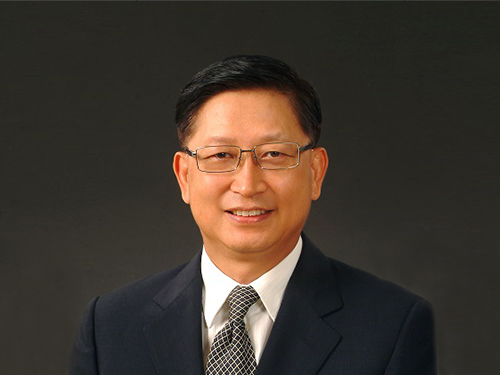 New KAA President Chilhee Chung Calls Alumni Engagement a Top Priority
The KAIST Alumni Association (KAA) inaugurated Advisor Chilhee Chung of Samsung Electronics as its new president. President Chung was preceded by Ki-Chul Cha, the CEO of Inbody Co. Ltd. His term as the 25th president starts from February 2020 and ends in January 2022.
President Chung received his master’s degree from KAIST's Department of Physics in 1979 and joined Samsung Electronics the same year. He also holds a doctorate in physics from Michigan State University in the United States.
President Chung devoted himself to helping Samsung Electronics and Korea's system semiconductor and memory device technologies achieve global dominance for more than 40 years. He led future technology development at Samsung Electronics in the fields of quantum dot and neural processing from various leadership positions, including the head of the Semiconductor R&D Center, and the president of Samsung Advanced Institute of Technology (SAIT).
President Chung is currently an advisor to SAIT, a member of the Presidential Advisory Council on Science and Technology (PACST), and the chairman of the 2045 National Future Strategy Committee and the Nano Technology Research Association (NTRA).
President Chung said, “KAIST, throughout its history of half a century, has been working tirelessly to become the world’s best, beyond being the best in Korea. We, the alumni of KAIST, have the commensurate duty as well as the privilege of being proud members of KAIST, as the university's global stature grows.”
“Recently, 46 alumni made 535 million won in donations, and established a scholarship to encourage entrepreneurial spirit in members of the KAIST community. This fund was dedicated to supporting 30 alumni entrepreneurs and students participating in the International Consumer Electronics Show (CES) 2020 that was held in Las Vegas last month. Moreover, another alumnus of ours Byeong-Gyu Chang, the CSO of the KRAFTON Inc., donated 10 billion won to KAIST in hopes of opening up more opportunities that may lead KAIST students to success. Mr. Chang’s donation is by far the largest that has been made by KAIST alumni. I feel grateful to see more alumni getting involved in shaping the future of KAIST these days, and my top priority as the new president of the KAA will be to stimulate the alumni association and engagement in the spirit of ‘Team KAIST’,” he added.
More than 900 alumni, including President Sung-Chul Shin who is also an alumnus of KAIST, gathered in Seoul on January 18 to celebrate the New Year and the newly-elected leadership of the KAA.
(END)
2020.02.03 View 8176
New KAA President Chilhee Chung Calls Alumni Engagement a Top Priority
The KAIST Alumni Association (KAA) inaugurated Advisor Chilhee Chung of Samsung Electronics as its new president. President Chung was preceded by Ki-Chul Cha, the CEO of Inbody Co. Ltd. His term as the 25th president starts from February 2020 and ends in January 2022.
President Chung received his master’s degree from KAIST's Department of Physics in 1979 and joined Samsung Electronics the same year. He also holds a doctorate in physics from Michigan State University in the United States.
President Chung devoted himself to helping Samsung Electronics and Korea's system semiconductor and memory device technologies achieve global dominance for more than 40 years. He led future technology development at Samsung Electronics in the fields of quantum dot and neural processing from various leadership positions, including the head of the Semiconductor R&D Center, and the president of Samsung Advanced Institute of Technology (SAIT).
President Chung is currently an advisor to SAIT, a member of the Presidential Advisory Council on Science and Technology (PACST), and the chairman of the 2045 National Future Strategy Committee and the Nano Technology Research Association (NTRA).
President Chung said, “KAIST, throughout its history of half a century, has been working tirelessly to become the world’s best, beyond being the best in Korea. We, the alumni of KAIST, have the commensurate duty as well as the privilege of being proud members of KAIST, as the university's global stature grows.”
“Recently, 46 alumni made 535 million won in donations, and established a scholarship to encourage entrepreneurial spirit in members of the KAIST community. This fund was dedicated to supporting 30 alumni entrepreneurs and students participating in the International Consumer Electronics Show (CES) 2020 that was held in Las Vegas last month. Moreover, another alumnus of ours Byeong-Gyu Chang, the CSO of the KRAFTON Inc., donated 10 billion won to KAIST in hopes of opening up more opportunities that may lead KAIST students to success. Mr. Chang’s donation is by far the largest that has been made by KAIST alumni. I feel grateful to see more alumni getting involved in shaping the future of KAIST these days, and my top priority as the new president of the KAA will be to stimulate the alumni association and engagement in the spirit of ‘Team KAIST’,” he added.
More than 900 alumni, including President Sung-Chul Shin who is also an alumnus of KAIST, gathered in Seoul on January 18 to celebrate the New Year and the newly-elected leadership of the KAA.
(END)
2020.02.03 View 8176 -
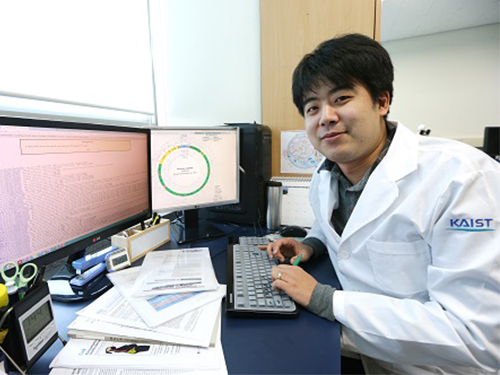 Professor Youngseok Ju Awarded the 13th ASAN Award for Young Medical Scientists
Professor Youngseok Ju from the Graduate School of Medical Science and Engineering was selected for the 13th ASAN Award for Young Medical Scientists under the age of 40. Professor Ju will receive 50 million won in prize money.
The ASAN Foundation established this Award in 2007 to encourage young medical scientists who accomplished outstanding achievements in basic and clinical medicine.
The winners are chosen based on a comprehensive assessment of consistency and originality, domestic and international impact, and contributions to medical development and fostering future generations.
Professor Ju is known for having identified the generation principle of cancer genome mutations. In particular, he is recognized for his contributions to the development of cancer prevention, diagnosis, and treatment, by having proven that some cases of lung cancer can occur from destructive changes in chromosomes in lung cells regardless of smoking.
The award ceremony will be held on March 19 in Seoul. The other award will be given to Professor Yong-Ho Lee from the Yonsei University College of Medicine.
2020.01.31 View 4788
Professor Youngseok Ju Awarded the 13th ASAN Award for Young Medical Scientists
Professor Youngseok Ju from the Graduate School of Medical Science and Engineering was selected for the 13th ASAN Award for Young Medical Scientists under the age of 40. Professor Ju will receive 50 million won in prize money.
The ASAN Foundation established this Award in 2007 to encourage young medical scientists who accomplished outstanding achievements in basic and clinical medicine.
The winners are chosen based on a comprehensive assessment of consistency and originality, domestic and international impact, and contributions to medical development and fostering future generations.
Professor Ju is known for having identified the generation principle of cancer genome mutations. In particular, he is recognized for his contributions to the development of cancer prevention, diagnosis, and treatment, by having proven that some cases of lung cancer can occur from destructive changes in chromosomes in lung cells regardless of smoking.
The award ceremony will be held on March 19 in Seoul. The other award will be given to Professor Yong-Ho Lee from the Yonsei University College of Medicine.
2020.01.31 View 4788 -
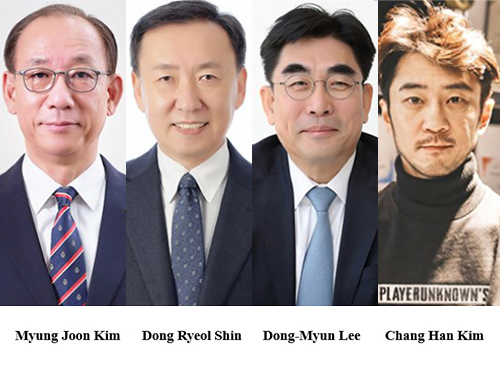 Distinguished Alumni Awardees 2019
The KAIST Alumni Association (KAA) announced four recipients of the Distinguished Alumni Awards for the year 2019. The awards ceremony took place during the New Year Alumni Reception on January 18, 2020 in Seoul.
The Distinguished Alumni Awards recognize graduates who have achieved outstanding accomplishments in their professional and personal lives, and who have been an inspiration to fellow alumni and students in Korea and around the globe. The four distinguished alumni of the year 2019 are listed below.
Myung Joon Kim (School of Computing, M.S., Class of ’78), the President of the Electronics and Telecommunications Research Institute (ETRI), is a renowned expert in software engineering who has served as the president of the Administration Division and ICT Creative Research Laboratory of ETRI. His research and leadership have contributed to fortifying the nation’s IT and electronic industry competitiveness.
Dong Ryeol Shin (School of Electrical Engineering, M.S., Class of ’80), the President of Sungkyunkwan University, is a well-versed expert experienced in both academia and industry. He suggested many creative interdisciplinary educational policies and innovative education programs to lead the way in the Fourth Industrial Revolution, and fostered talents who will go on to be the foundation of national development.
Dong-Myun Lee (School of Electrical Engineering, M.S., Class of ’85, Ph.D., Class of ‘87), the CTO and the head of the Institute of Convergence Technology in KT Corporation, is a creative and practical research innovator. He raised the nation’s competitiveness by leading the development of the high-speed communication network industry and the global expansion of next-generation technology business.
Chang Han Kim (School of Computing, B.S., Class of ’92, M.S., Class of ’97, Ph.D., Class of ’98), the CEO of PUBG Corporation, has contributed greatly to the development of the IT contents industry. He developed PlayerUnknown’s Battlegrounds, a game that has become a global sensation.
Since the establishment of the award in 1992, a total of 103 alumni at home and abroad have been honored as recipients, and brought distinction to the university.
These recipients are playing major roles in society, and some of the notable awardees include: KAIST President Sung-Chul Shin (2010), Samsung Electronics Vice Chairman Ki-Nam Kim (2012), Nexon Chairman Jung-Ju Kim (2007), and the former Science and Technology Advisor to the President Kong-Joo Lee (2005).
The President of KAA and the CEO of Inbody Co Ltd., Ki-Chul Cha, said, “The Distinguished Alumni Awards are honor given to the alumni who contributed to the development of the nation and society, and raised the name of their alma mater.” He added, “We can tell the proud position of KAIST in the global arena just by looking at the accomplishments of the previous awardees.”
(END)
2020.01.20 View 10574
Distinguished Alumni Awardees 2019
The KAIST Alumni Association (KAA) announced four recipients of the Distinguished Alumni Awards for the year 2019. The awards ceremony took place during the New Year Alumni Reception on January 18, 2020 in Seoul.
The Distinguished Alumni Awards recognize graduates who have achieved outstanding accomplishments in their professional and personal lives, and who have been an inspiration to fellow alumni and students in Korea and around the globe. The four distinguished alumni of the year 2019 are listed below.
Myung Joon Kim (School of Computing, M.S., Class of ’78), the President of the Electronics and Telecommunications Research Institute (ETRI), is a renowned expert in software engineering who has served as the president of the Administration Division and ICT Creative Research Laboratory of ETRI. His research and leadership have contributed to fortifying the nation’s IT and electronic industry competitiveness.
Dong Ryeol Shin (School of Electrical Engineering, M.S., Class of ’80), the President of Sungkyunkwan University, is a well-versed expert experienced in both academia and industry. He suggested many creative interdisciplinary educational policies and innovative education programs to lead the way in the Fourth Industrial Revolution, and fostered talents who will go on to be the foundation of national development.
Dong-Myun Lee (School of Electrical Engineering, M.S., Class of ’85, Ph.D., Class of ‘87), the CTO and the head of the Institute of Convergence Technology in KT Corporation, is a creative and practical research innovator. He raised the nation’s competitiveness by leading the development of the high-speed communication network industry and the global expansion of next-generation technology business.
Chang Han Kim (School of Computing, B.S., Class of ’92, M.S., Class of ’97, Ph.D., Class of ’98), the CEO of PUBG Corporation, has contributed greatly to the development of the IT contents industry. He developed PlayerUnknown’s Battlegrounds, a game that has become a global sensation.
Since the establishment of the award in 1992, a total of 103 alumni at home and abroad have been honored as recipients, and brought distinction to the university.
These recipients are playing major roles in society, and some of the notable awardees include: KAIST President Sung-Chul Shin (2010), Samsung Electronics Vice Chairman Ki-Nam Kim (2012), Nexon Chairman Jung-Ju Kim (2007), and the former Science and Technology Advisor to the President Kong-Joo Lee (2005).
The President of KAA and the CEO of Inbody Co Ltd., Ki-Chul Cha, said, “The Distinguished Alumni Awards are honor given to the alumni who contributed to the development of the nation and society, and raised the name of their alma mater.” He added, “We can tell the proud position of KAIST in the global arena just by looking at the accomplishments of the previous awardees.”
(END)
2020.01.20 View 10574 -
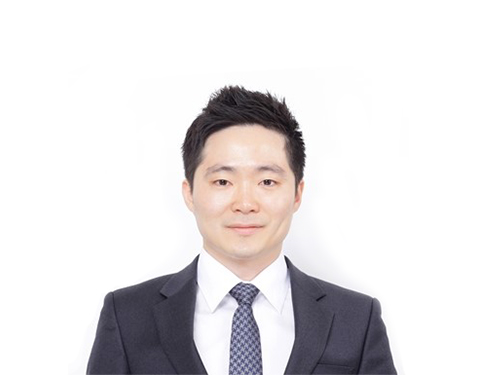 Professor Sungyeol Choi Receives Science and ICT Ministerial Commendation
< Professor Sungyeol Choi >
Professor Sungyeol Choi from the Department of Nuclear and Quantum Engineering received the Science and ICT Ministerial Commendation on the 9th Annual Nuclear Safety and Promotion Day last month, in recognition of his contributions to the promotion of nuclear energy through the safe management of spent nuclear fuel and radioactive waste.
Professor Choi developed high-precision, multi-physics codes that can predict and prevent abnormal power fluctuations caused by boron hideout within nuclear fuel in a pressurized water reactor, solving the problem that has caused economic losses of tens of billions of won every year from industrial sites.
He is now developing a new technology that can reduce high-level waste by recycling spent nuclear fuel, while preventing nuclear material from being used for nuclear weapons, which is one of the biggest challenges faced by the nuclear industry.
In 2017, his first year in office as a KAIST professor, Professor Choi was selected as the youngest and the only member under 50 of the Standing Scientific Advisory Committee at the Information Exchange Meeting on Partitioning and Transmutation (IEMPT), an authoritative association on the disposal of high-level nuclear waste.
The following year, he became the first Korean to receive the Early Career Award, which is given to one person every two years by the International Youth Nuclear Congress.
2020.01.15 View 5872
Professor Sungyeol Choi Receives Science and ICT Ministerial Commendation
< Professor Sungyeol Choi >
Professor Sungyeol Choi from the Department of Nuclear and Quantum Engineering received the Science and ICT Ministerial Commendation on the 9th Annual Nuclear Safety and Promotion Day last month, in recognition of his contributions to the promotion of nuclear energy through the safe management of spent nuclear fuel and radioactive waste.
Professor Choi developed high-precision, multi-physics codes that can predict and prevent abnormal power fluctuations caused by boron hideout within nuclear fuel in a pressurized water reactor, solving the problem that has caused economic losses of tens of billions of won every year from industrial sites.
He is now developing a new technology that can reduce high-level waste by recycling spent nuclear fuel, while preventing nuclear material from being used for nuclear weapons, which is one of the biggest challenges faced by the nuclear industry.
In 2017, his first year in office as a KAIST professor, Professor Choi was selected as the youngest and the only member under 50 of the Standing Scientific Advisory Committee at the Information Exchange Meeting on Partitioning and Transmutation (IEMPT), an authoritative association on the disposal of high-level nuclear waste.
The following year, he became the first Korean to receive the Early Career Award, which is given to one person every two years by the International Youth Nuclear Congress.
2020.01.15 View 5872 -
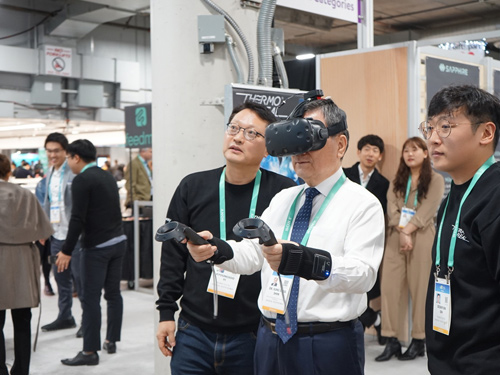 KAIST Showcases Advanced Technologies at CES 2020
< President Sung-Chul Shin experiencing cooling gaming headset developed by TEGWAY >
KAIST Pavilion showcased 12 KAIST startups and alumni companies’ technologies at the International Consumer Electronics Show (CES) 2020 held in Las Vegas last month. Especially four companies, TEGWAY, THE.WAVE.TALK, Sherpa Space, and LiBEST won the CES 2020 Innovation Awards presented by the Consumer Technology Association (CTA). The CTA selects the most innovative items from among all submissions.
TEGWAY spinned off by KAIST Professor Byung Jin Cho already made international headlines for their flexible, wearable, and temperature immersive thermoelectric device. The device was selected as one of the top ten most promising digital technologies by the Netexplo Forum in 2015, and has been expanded into VR, AR, and games.
THE.WAVE.TALK has developed their first home appliance product in collaboration with ID+IM Design Laboratory of KAIST in which Professor Sang-Min Bae heads as creative director. Their real-time bacteria analysis with smart IoT sensor won the home appliances section.
Sherpa Space and LiBEST are the alumni companies. Sherpa Space’s lighting for plants won the sustainability, eco-design, and smart energy section, and LiBEST’s full-range flexible battery won the section for technology for a better world.
KAIST’s Alumni Association, Development Foundation, and the Office of University-Industry Cooperation (OUIC) made every effort to present KAIST technologies to the global market. President Sung-Chul Shin led the delegation comprising of 70 faculty, researchers, and young entrepreneurs. The KAIST Alumni Association fully funded the traveling costs of 30 alumni entrepreneurs and students, establishing scholarship for the CES participation. Ten young entrepreneurs were selected through the KAIST Startup Awards, and 20 current students preparing to start their own companies were selected via recommendation from the respective departments.
Associate Vice President of the OUIC Kyung Cheol Choi said in excitement, “We received many offers for joint research and investment from leading companies around the world,” adding, “We will continue doing our best to generate global value by developing the innovative technologies obtained from education and research into businesses.”
The KAIST pavilion at CES 2020 showcased:
1. flexible thermoelectric device ThermoReal and cooling gaming headset from TEGWAY,
2. wearable flexible battery from LiBEST,
3. applications such as conductive transparent electrode film and transparent heating film from J-Micro,
4. on-device AI solution based on deep learning model compression technology from Nota,
5. portable high resolution brain imaging device from OBELAB,
6. real-time bacteria analysis technology from THE.WAVE.TALK,
7. conversation-based AI-1 radio service platform from Timecode Archive,
8. light source solutions for different stages in a plant’s life cycle from Sherpa Space,
9. skin attached micro-LED patch and flexible piezoelectric acoustic sensor from FRONICS,
10. real-time cardiovascular measurement device from Healthrian,
11. block chain based mobile research documentation system from ReDWit, and
12. student-developed comprehensive healthcare device using a smart mirror.
(END)
2020.01.13 View 12900
KAIST Showcases Advanced Technologies at CES 2020
< President Sung-Chul Shin experiencing cooling gaming headset developed by TEGWAY >
KAIST Pavilion showcased 12 KAIST startups and alumni companies’ technologies at the International Consumer Electronics Show (CES) 2020 held in Las Vegas last month. Especially four companies, TEGWAY, THE.WAVE.TALK, Sherpa Space, and LiBEST won the CES 2020 Innovation Awards presented by the Consumer Technology Association (CTA). The CTA selects the most innovative items from among all submissions.
TEGWAY spinned off by KAIST Professor Byung Jin Cho already made international headlines for their flexible, wearable, and temperature immersive thermoelectric device. The device was selected as one of the top ten most promising digital technologies by the Netexplo Forum in 2015, and has been expanded into VR, AR, and games.
THE.WAVE.TALK has developed their first home appliance product in collaboration with ID+IM Design Laboratory of KAIST in which Professor Sang-Min Bae heads as creative director. Their real-time bacteria analysis with smart IoT sensor won the home appliances section.
Sherpa Space and LiBEST are the alumni companies. Sherpa Space’s lighting for plants won the sustainability, eco-design, and smart energy section, and LiBEST’s full-range flexible battery won the section for technology for a better world.
KAIST’s Alumni Association, Development Foundation, and the Office of University-Industry Cooperation (OUIC) made every effort to present KAIST technologies to the global market. President Sung-Chul Shin led the delegation comprising of 70 faculty, researchers, and young entrepreneurs. The KAIST Alumni Association fully funded the traveling costs of 30 alumni entrepreneurs and students, establishing scholarship for the CES participation. Ten young entrepreneurs were selected through the KAIST Startup Awards, and 20 current students preparing to start their own companies were selected via recommendation from the respective departments.
Associate Vice President of the OUIC Kyung Cheol Choi said in excitement, “We received many offers for joint research and investment from leading companies around the world,” adding, “We will continue doing our best to generate global value by developing the innovative technologies obtained from education and research into businesses.”
The KAIST pavilion at CES 2020 showcased:
1. flexible thermoelectric device ThermoReal and cooling gaming headset from TEGWAY,
2. wearable flexible battery from LiBEST,
3. applications such as conductive transparent electrode film and transparent heating film from J-Micro,
4. on-device AI solution based on deep learning model compression technology from Nota,
5. portable high resolution brain imaging device from OBELAB,
6. real-time bacteria analysis technology from THE.WAVE.TALK,
7. conversation-based AI-1 radio service platform from Timecode Archive,
8. light source solutions for different stages in a plant’s life cycle from Sherpa Space,
9. skin attached micro-LED patch and flexible piezoelectric acoustic sensor from FRONICS,
10. real-time cardiovascular measurement device from Healthrian,
11. block chain based mobile research documentation system from ReDWit, and
12. student-developed comprehensive healthcare device using a smart mirror.
(END)
2020.01.13 View 12900